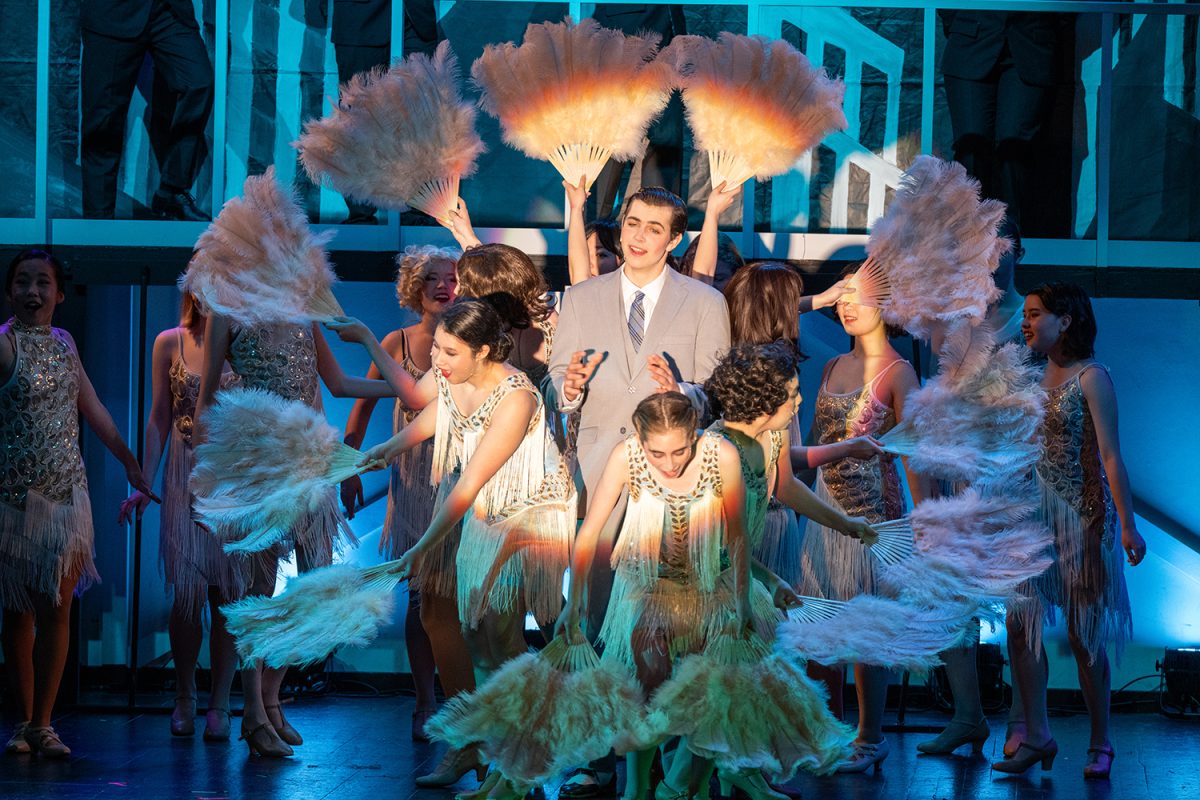
Damian Marhekfa
Jasper, as Billy Flynn, takes the spotlight in his solo number that also serves as his introduction, "All I Care About Is Love."
A year ago, director Zoe Swenson-Graham started thinking about Chicago. It was immediately after Mamma Mia, a cheerful musical bursting with joy and humor—the type of show they’d consistently done over the course of her time at Nueva. Chicago seemed fresh and darker, a jump into a genre of satire and drama that was entirely new.
Fast forward to the beginning of the semester: the cast voted between Legally Blond and Chicago to select this year’s spring musical. Chicago won by just one vote.
Chicago is a dramatic, comedic show that tackles 1920s corruption and media sensationalization with giant dance numbers and glittering costumes. The 1975 musical follows Roxie Hart and Velma Kelly, two murderers who manage to walk free with the help of charismatic lawyer Billy Flynn. The two women compete with each other for attention, yet are similar to their core—selfish, dramatic, and obsessed with fame.
At times, the show is vulgar and racy, which left it up to Zoe to figure out how to handle Chicago’s maturity. Beginning with the teen version of Chicago, Zoe added back a few iconic songs and revised some dialogue—always including the cast in the decision-making procedure.
“I firmly believe that this is a collaborative process,” Swenson-Graham said. “Everyone’s voice matters.”
That collaboration was further reflected in the various tech teams that oversaw everything from bedazzled, sequin costumes to props like fire spinners and enormous fans.
As a part of the dramaturgy team, Willa N. ’28 enjoyed learning about the historical context of the show. She delved into crime cases that mimicked Velma Kelly and Roxie Hart’s, meticulously combed through each scene for pop culture reference from the 1920s, and compiled each fact alongside her peers into a presentation for the whole cast.
Willa began to understand the show, and its themes better in that process. For instance, she discovered that in 1920, Chicago Hungarian ethnic communities were reasonably isolated, suffered from city crime, and many of its members did not speak English.
In the show, the minor character Hunyak, a Hungarian immigrant who is an inmate alongside Roxie and Velma, reflects this history. Played by Lila P. ’26, she is the only innocent convict. She repeats two English words she knows—”not guilty”—over and over until her execution at the hands of the state.
“This is the one moment in the show where nothing is performative, and there is no joke,” Willa said.
On stage, Hunyak’s death is short, but shadows the rest of the show. Guilty convicts Roxie and Velma manage to get off completely scot-free, and remain just as narcissistic and selfish as before. Their comments on the state of America—“down in the news recently, but we represent the best of it”—and their peacocking ways gain a sinister edge, even amongst their champagne tassel dresses, the glorious finale duet, and the ensemble crowd of adoring fans.

“Who does the justice system serve? How do we, as a society, treat the people there? How have we improved [since the 1920s], and what work do we need to do?” Swenson-Graham said. “The questions [posed by the show] are timely.”
The seriousness of the show’s themes was alleviated by a lighthearted and tight-knit cast. Archie B. ’26 describes the Nueva theater community as one of the most welcoming spaces he’s ever been in.
“Whether you’re a freshman or a senior, everyone has a place in the class,” Archie said.
It’s a lesson that Jasper F. ’25 internalized as a freshman in his first high school show, and one he tried to model as a senior.
“I always try to branch out to talk to and meet the new people, make sure they know they’re welcome and they belong,” Jasper said.
That friendly spirit colored the entire production: cast dinners after late night rehearsals, little dances off stage to the beats of Funny Honey, and inside jokes around Jasper’s line: “Step down, daddy.” The line even made its way into the first ever senior night, a new event during the cast party organized by the underclassmen, on Jasper’s senior poster.
The night itself was incredibly special for Mari M. ’25, who saw the tradition as a culmination of all the new connections formed over the course of the semester.
“The night just made the seniors all feel so loved,” Mari said. “And so something I’ll always remember about this cast is how the underclassmen and juniors are carrying forward that culture of love and joy—picking up the baton as it were.”